朗文听力unit 5
朗文2A Chapter5 (单词+课文)
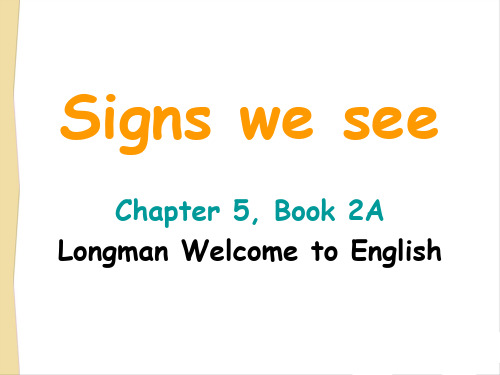
throw litter
Sign
Don’t make a noise.
make a noise
review
Fill in the signs
climb the trees walk on the grass
pick the flowers
feed the ducks
throw litter make a noise
Signs we see
Chapter 5, Book 2A Longman Welcome to English
sign
指示牌;标示
Question:
What signs in the park?
Sign
Don’t climb the trees.
climb the trees
Sign
Rewrite the sentences with don’t or do not.
1
Do not pick the flowers. _D_o_n_’t_p_ic_k_t_h_e_f_lo_w_e_rs_.____
2
Don’t feed the ducks.
_D_o_n_o_t_f_ee_d__th_e_d_u_c_k_s.____
No, we can’t. Look at the sign. It says: Do not __f_e_ed_t_h_e_d_u_c_ks.
Can we ____ ___ ____ ?
No, we can’t. Look at the sign. It says: Do not ____ ___ ____.
Don’t _p_ic_k_ the flowers.
Don’t _fe_e_d_ the ducks.
香港朗文5Achapter5Festivals around the world Practice1

Introduction
Answer
Your Turn
A
: Which festival do you like?
B (Helen) : I like CHherisletmnas beca?use I enjoy decorating
the Christmas tree.
Introduction
Introduction
Answer
Your Turn
Who drew this picture?
eat
Introduction
Answer
Your Turn
eat
What festival did he draw about?
Introduction
Answer
Your Turn
What is he eating?
the Christmas tree.
Introduction
Answer
Your Turn
Now get into pairs and finish the Practice.
Introduction
Answer
Your Turn
A
: Which festival do you like?
B (Helen) : I likeHCehlreisntmas be?cause I enjoy decorating
Your Turn
You’re going to role-play the children to talk about the festival they like and what they like doing at that festival.
Unit 5 听力材料及参考答案
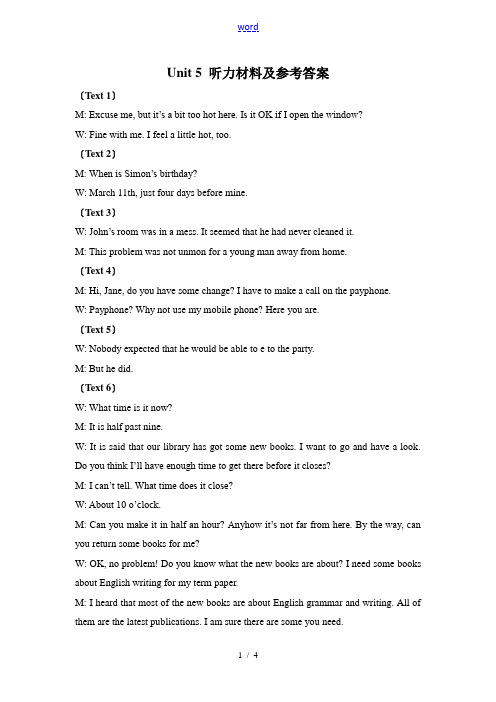
Unit 5 听力材料及参考答案〔Text 1〕M: Excuse me, but it’s a bit too hot here. Is it OK if I open the window?W: Fine with me. I feel a little hot, too.〔Text 2〕M: When is Simon’s birthday?W: March 11th, just four days before mine.〔Text 3〕W: John’s room was in a mess. It seemed that he had never cleaned it.M: This problem was not unmon for a young man away from home.〔Text 4〕M: Hi, Jane, do you have some change? I have to make a call on the payphone.W: Payphone? Why not use my mobile phone? Here you are.〔Text 5〕W: Nobody expected that he would be able to e to the party.M: But he did.〔Text 6〕W: What time is it now?M: It is half past nine.W: It is said that our library has got some new books. I want to go and have a look. Do you think I’ll have enough time to get there before it closes?M: I can’t tell. What time does it close?W: About 10 o’clock.M: Can you make it in half an hour? Anyhow it’s not far from here. By the way, can you return some books for me?W: OK, no problem! Do you know what the new books are about? I need some books about English writing for my term paper.M: I heard that most of the new books are about English grammar and writing. All of them are the latest publications. I am sure there are some you need.W: That’s great. Oh, it’s already 9:40. There are only 20 minutes left. I’d better get going. See you!M: See you!〔Text 7〕W: What happened?M: Well, I was lying in the sand enjoying the music on the radio when suddenly I heard someone shouting for help. So I jumped up and saw a little boy waving his arms in the air. I took off my shirt and my watch and jumped into the water. I brought him back.W: Was there anybody else around?M: No. Not at that moment.W: Where were his parents?M: They were away buying some drinks.〔Text 8〕W: What time does Mother’s plane arrive?M: I’m not sure, but I think it is at 2:13. I’ll call the airport to make sure.W: Why don’t you do that while I change my clothes?M: Do you think Dick or Brenda wants to go?W: I don’t know. I think we can call them.M: I know Dick has to work, but maybe Brenda can go.W: OK, call her first, then the airport. I’ll go and get ready.〔Text 9〕M: Hello, Mary. Why are you standing here in the cold wind?W: I’m waiting for a bus; but the buses are very full at this time of the day.M: Where are you going? This isn’t your way home. You must take a bus from the other side of the street to go home.W: I’m not going home now. I’m going for a walk in the park. I always like to go for a walk before lunch.M: Then why not walk from her e to the park, too? It isn’t very far.W: Oh, no, Bill. It isn’t very interesting to walk through the street; in fact, it’s veryboring. So I always take a No. 3 bus.〔Text 10〕Few people would even think of beginning a new job at the age of 76, but one of America’s most famous artists did just that. Anna Mary Robertson, better known as “Grandma Moses〞, turned to painting because she was too old to work on her farm.Grandma Moses painted carefully and her works were nice. She first painted only to enjoy herself, and then began to sell her works for a little money. In 1939, a collector, Louis Caldor happened to see several of Grandma Moses’ works hanging in a shop. He liked them, bought them at once, and set out to look for more. Caldor held a show to introduce the works of Grandma Moses to other artists.Grandma Moses died on December 13, 1961, at the age of 101. She was world famous.参考答案:1-5 AABCB 6-10 BCACC11-15 CBACB 16-20 CAABA21-25 CDCBA 26-30 BBDBC31-35 ACACB 36-40 DBCDA41-45 CDBAB 46-50 ACCDB51-55 ABACD 56-60 CABDB61-65 BCEAD66. This small village is surrounded by green mountains and clear waters.67. As far as I know, he has a gift for business.68.With the development of Chinese economy, many foreigners have settled in China.69. I can’t figure out how beautiful the Three Gorges will be in the future.70. It’s extremely cold in winter in HeilongjiangProvince, which is in the northeast of China.One possible version:Ladies and gentlemen,Wele to our city.I’d like to tell you something about our city. Nanjing, the capital of JiangsuProvince, lies in the southeast of China. It has a population of about 5 million. The city has a history of more than 2,400 years, and was once the capitals of ten dynasties. It is a very beautiful city with a lot of places of interest, such as the XuanwuLake, the JimingTemple and the StoneCity. It also has many modern factories and high buildings.I’m sure you will have a good time here.Thank you.。
Unit 5 朗文英语听说教程
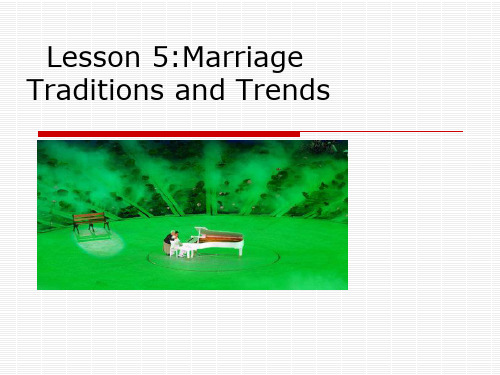
?
Task 2:What wedding do you prefer?
Go to a church Have a feast in a restaurant Spend a honeymoon Friend together Relative together Expensive/cheap ceremony “Naked” wedding
Selection of partners
Exogamy—outside of the group Endogamy—inside of the group How many categories of groups can you classify? racial national socioeconomic religious regional immediate family linguistic cultesponsibility
What is usband’s and wife’s?
What is husband’s and wife’s obligation and responsibility?
Whose obligation?
Husband 1 2 3 Wife 1 2 3
arranged marriage vs love marriage
Why marriage changed? 1. family structure changed extended family nuclear family 2. choice freedom
exogamy endogamy
Lesson 5:Marriage Traditions and Trends
香港朗文版4A-Chapter5

What is this ?
Examples
+ er
+r –y -i + er 双写辅音字母 + er
tall taller short shorter small smaller
large larger nice nicer
hungry hungrier happy happier heavy heavier
The turtle is the king in the sea.
What animal will be the king on land?
(陆地动物谁能称王呢?)
I think the horse. It is tall.
tall
a horse
The horse, the camel and the giraffe are tall.
Animals big and small
DTuorlptleh:inI:waInwt taontbe the tk明IoiStn)habhgme.e.arIkbtkaihen:meagIu.kctIilwienfaagvumne.lt.r(stto聪robneg.
One day, the sea animals chose (选) a king.
+r
large the largest
nice the nicest
–y -i + er
hungry the hungriest happy the happiest heavy the heaviest
双写辅音字母 big
+ er
fat fit
the biggest the fattest the fittest
朗文英语听说教程答案
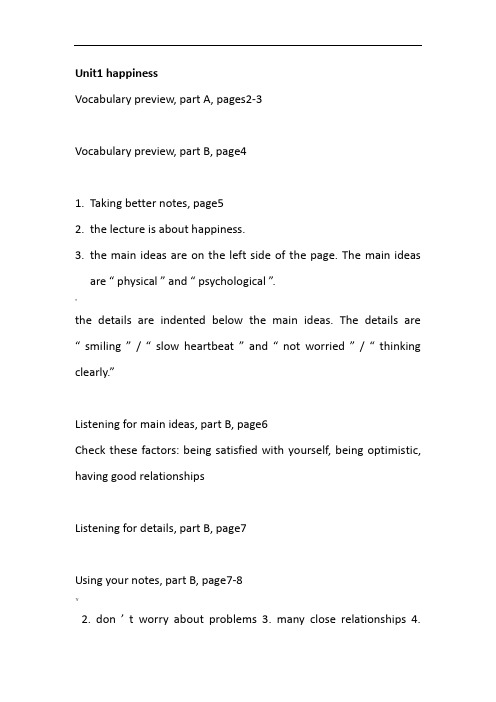
Unit1 happinessVocabulary preview, part A, pages2-3Vocabulary preview, part B, page41.Taking better notes, page52.the lecture is about happiness.3.the main ideas are on the left side of the page. The main ideasare “ physical ” and “ psychological ”.*the details are indented below the main ideas. The details are “ smiling ” / “ slow heartbeat ” and “ not worried ” / “ thinking clearly.”Listening for main ideas, part B, page6Check these factors: being satisfied with yourself, being optimistic, having good relationshipsListening for details, part B, page7Using your notes, part B, page7-8¥2. don ’ t worry about problems3. many close relationships4.family and friends 5. always want to change 6. lose weight 7. assume things will get worse 8. worry about their problems 9. new friends 10. work too muchUnit 2 new kinds of foodVocabulary preview, part A, pages 11-1210bVocabulary preview, part B, page12·Vocabulary preview, part C, page131.Taking better notes, pages 13-142.this lecture is about growing organic food.3.the notes are divided into benefits and riskstwo benefits and two risks are listedlistening for main ideas, Part B, page15(benefits: a b drisks: b c e1.listening for details, part B, page15 corning your notes, part B, page162.corn kills insects that eat the plant.3.{4.grow better.5.tomato stays fresh for two months.6.dominate other plants.7.corn can hut butterflies that live nearby. harmful to people.Unit 3 public art$Vocabulary preview, part A, pages 19-2010aVocabulary preview, part B, page20 Vocabulary preview, part C, page 211.Taking better notes,2.<3.the name of the sculpture is knot.4.cosimo cavallaro made it.5.knot was made in 1996. it is 10 feet by 16 feet by 8 feet andweighs 2,400 pounds. It is made of rusted steel.the sculpture symbolizes human feelings and confusion.Listening for main ideas, Part B, page24and cherry【Listening for details, part B, page24ing your notes, part B, page252.public art is usually outdoors in public places. It is becomingmore popular.3.one purpose of public art is to make cities more beautiful andinteresting and let people enjoy art.4.one example is spoonbridge and cherry. It is a huge metalsculpture. It is silver and red. It ’ s an example of pop art, which is art about everyday things.5.another purpose of public art is to illustrate concepts or topromote beliefs.6.}7.one example is peace. It is a statue of a woman on a horse, and itis a realistic statue. It is a symbol of peace.another example is non-violence. It is a metal sculpture. It looks like a gun tied in a knot. This is impossible, so this sculpture is an example of surrealism. Its purpose is to promote peace.Unit4 journey to AntarcticaVocabulary preview, part B, page28Taking better notes, pages29-30~7/1907 4.10/29/1908 5.>2 mos .1/9/1909Listening for main ideas, part B, page 311 4 32 6 7 5Listening for details, part B, page323F 4F 5T 6T 7F 8F&Using your notes, part B, pages32-332 3 oct. 27 9 5 may 20 6 aug. 30Unit 5 violence on televisionVocabulary preview, part A, pages 36-371a 2a 3b 4b 5c 6b 7c 8a 9c 10aVocabulary preview, part B, page 371a 2a 3b 4b 5a【Vocabulary preview, part C, page381 act2 long-term3 average4 focused5 impact 6estimate 7 characters 8 immediate 9 assess 10 linkTaking better notes, pages 38-39Answers will vary.Listening for main ideas, part B, page394231Listening for details, part B, page 401c 2a 3b 4a 5c 6b 7c 8b@Using your notes, part B, page41Almost 98% of American families have a television.Cartoons have more acts of violence than adult TV shows.A child sees about 100000 acts of violence by age 12.When children watch a lot of TV, they are more violentUnit6 too old to learnVocabulary preview, part B, page44<1f 2c 3g 4h 5a 6j 7c 8b 9i 10dVocabulary preview, part C, page451 remove2 adolescents3 skill4 evidence5 conclude6 theory7 native8 period9 accent 10 criticalTaking better nots, pages45-461 L12 L2 3. Diff between L1+L2Listening for main ideas, part B, page471b 2b 3cListening for details, part B, page48.1a 2b 3a 4c 5bUsing your notes, part B, page491 animals or humans2 to sing3 hear parent ’ s song4 to see5 have light6 to speak without accent7 be youngUnit7 are we aloneVocabulary preview, part A, page 52Paragraph 11c 2b 3d 4a。
朗文英语听说教程答案

朗文英语听说教程(一)Quiz Unit1HappinessWhat did psychologists want to find out?1.a.Which people are happy b.What makes people happy c.How people def ine happinessHow do happy people feel about their lives?2.a.They like everything. b.They want to change. c.They are satisfied.Why are happy people optimistic?3.a.They have few problems. b.They don’t worry much. c.They have negative attitudes.What factor is most important for happiness?4.a.Good relationships b.A successful career c.A lot of money5.Describe how psychologists learned what makes people happy.Psychologists asked hundreds of people how happy they are.Then they asked questi ons to find out about their personalities.They looked at the differences between ha ppy people and unhappy people.6.What three personality factors do happy people have?Happy people are satisfied with themselves.They are also optimistic about their pro blems.In addition,they have good relationships with their friends and family.Unit2New Kinds of Food(1’:50”)What is genetically modified food?1.a.Fresh food b.Dangerous food c.Altered foodWhat genetically modified fruit did the speaker mention?2.a.Strawberries b.Apples c.BananasWhat is a benefit of genetically modified food?3.a.It needs fewer pesticides. b.It grows in less space. c.It dominates the env ironment.What is a risk of genetically modified food?4.a.It may stay fresh longer. b.It may be more expensive. c.It may be harmf ul to people.5.What are three benefits of genetically modified food?Genetically modified food needs fewer pesticides.Genetically modified food/plants gr ow better than normal.In addition,they stay fresh longer after they are harvested.6.What are three risks of genetically modified food?Genetically modified food/plants may dominate other plants in the environment.Als o,they might hurt wild animals and insects.They might even hurt the people who eat them.Unit3Public Art(2’:02”)What is public art?1.a.Art in museums b.Art in people’s houses c.Art in public placesWhat sculpture is an example of realistic art?2.a.Spoonbridge and Cherry(spoon and cherry) b.Non-Violence(gun in knot)c.Peace(woman on horse)What concept do two of the sculptures in the lecture symbolize?3.a.Public art b.Surrealism c.PeaceWhat is the main purpose of public art?4.a.To make people go to museums b.To make artists more popularc.To make public places more beautiful5.What is pop art?Give an example.Pop art shows things people see in their everyday lives.Spoonbridge and Cherry,the sculpture of a large spoon with a cherry,is an example of pop art.6.What is surrealistic art?Give an example.Surrealistic art shows things that are strange or impossible.Non-Violence,the sculptur e of a gun tied in a knot,is an example of surrealistic art.Unit4Journey to AntarcticaWhen did Shackleton and his crew make their journey?1.a.From1912to1914 b.From1914to1916 c.From1916to1918Where did Shackleton and five men go for help?2.a.South Georgia Island b.Elephant Island c.ArgentinaWhat finally happened to Shacklenton and his crew?3.a.Everyone died. b.Some were rescued. c.Everyone was rescued.What finally happened to the Endurance?4.a.It reached America. b.It sank near Antarctica. c.It returned to London.5.What was the goal of Shackleton’s Journey?Did he succeed?Shackleton’s goal was to be the first person to walk across Antarctica.He didn’t succeed.6.What did Shackleton and his crew eat when they were living on ice?First,they ate supplies from the ship.Then they hunted animals in the area.Finally, they killed and ate their dogs.Unit5Violence on Television(2’:11”)How much TV does the average American child watch?1.a.Three to four hours a day b.Three to four hours a week c.Thirty to for ty hours a weekWhat TV shoes have the most violent acts?2.a.Movies b.Cartoons c.The newsHow many violent acts does the average child see on television by age twelve?3.a.About1,000 b.About10,000 c.About100,000What did the two studies show? violence is linked to real violence. violence is not harmful for chil dren. violence is increasing in the United States.5.How did researchers study the immediate effects of TV violence on children?The researchers showed children a TV show of a child hitting and kicking a doll.Th en they left the children alone with a doll.The children hit and kicked the doll.Thi s study showed that children do what they see on TV.6.How did researchers study the long-term of TV violence on children?The researchers studied how much violent television some children watched at age eight.Then they studied the same children at age eighteen.The children who watched a lot of violence TV were more violent at age eighteen.Unit6Too Old to Learn?(2’:06”)What do animals learn new skills?1.a.Before the critical period b.During the critical period c.After the critical p eriodWhat must young kittens learn to do?2.a.See b.Eat c.MeowWhat must young songbirds learn to do?3.a.See b.Eat c.SingWhat changes after the critical period in humans?4.a.The ability to hear sounds b.The ability to pronounce sounds c.The size of the brain5.Define critical period.Give an example.The critical period is when an animal or human can learn a new skill.For example, in humans there is a critical period for language learning.6.What is difficult for adult language learners?Why?Adults find it difficult to pronounce sounds correctly.Therefore,they may never lear n to speak a new language with a native accentUnit 7 Are We Alone? (2’:15”)What is the SETI project looking for ?1. a. Intelligent beingsb. Other galaxiesc. Rocket shipsWhy do some scientists think there is intelligent life on other planets ?2. a. They have received signals from other planets.b. They have seen rockets from other planets.c. They believe other planets could support life.How does the SETI project look for life in other galaxies ?3. a. By sending out radio signalsb. By listening for radio signalsc. By sending out rocketsWhy does the STEI project look for radio signals ?4. a. Radio signals travel quickly and have a short range.b. Radio signals travel quickly and have a long range.c. Radio signals travel slowly and have a long range.5. How fast do radio signals travel? How long is needed for a radio signal to travel from the nearest galaxy to earth?Radio signals travel at the speed of light. A radio signal travels about four years from the nearest galaxy to earth.6. Why doesn’t the SETI project use rockets to look for intelligent life?Rocket ships are restricted to traveling in one direction. And they are much slower than radio signals.Unit8Do the Right Thing(1’:55”)What is the principle of common good?1.a.Do what is best for most people. b.Do what is best for everybody. c.Do what is best for yourself.What is the principle of individual rights?2.a.Take care of other people. b.Do what is best for yourself. c.Make your own decisions.Whose writings is the principle of individual rights based on?3.a.Aristotle b.Kant c.BenthamWhat ethical principle can be used to justify lying?4.a.The principle of individual rights b.The principle of individual good c.T he principle of common good5.Explain why the friend in the lecture wanted to lie to the dying woman.The friend thought spending a lot of money on an expensive funeral was a waste of money.He wanted to give the money to a school for homeless children.e an ethical principle to explain how the friend can justify lying to the dying woman.Following the principle of common good,the friend will help more peopl e if he gives the money to the school for homeless children.The only person he mi ght hurt is the dying woman.Unit 9 A Good Night’s SleepHow does the National Sleep Center learn about sleep ?1. a. From watching people sleepb. From surveys about sleep habitsc. From books about sleep habitsWhat is a cause of sleep deprivation ?2. a. Our modern lifestyleb. Feeling tiredc. Health problemsWhat is an effect of sleep deprivation ?3. a. Car accidentsb. Watching TVc. Family problemsWhat percentage of Americans feel sleepy when driving ?4. a. Seventeenb. Twentyc. Fifty5. How has technology affected our sleep habits?A hundred years ago, people didn’t stay up late because there was not much to do. However, today we can stay up late working, watching TV, or using the Internet.6. How does feeling sleepy affect people at work?When people are sleepy at work, they don’t think clearly and can make mistakes. These mistakes can cost a lot of money or cause accidents.Unit 10 Negotiating for SuccessWhat is one technique for successful negotiation ?1. a. Solving the problemb. Talking about feelingsc. Using “I”statementsWhy should you use I statements in a negotiation ?2. a. To explain your opinionb. To solve the problemc. To avoid blaming othersWhat often happens if you blame someone in a negotiation ?3. a. The person stops communicating.b. The person accepts the blame.c. The person solves the problem.What usually causes problems in a negotiation ?4. a. The issue in the negotiationb.People’s feelings about the negotiationc. The people in the negotiation5. Explain the example of conflict in the lecture. Who has a conflict? What is it about?Two co-workers have a conflict. They are working on a project together. One person isn’t finishing his work on time.6. Give an example of a statement blaming another person. Then rewrite the statement using an “I”statement.A statement blaming another person is “You aren’t doing your work, Joe.”An “I”statement is “I’m worried because the work isn’t done.”Unit11Risking ItWhat activity has a high perceived risk?1.a.Flying in an airplane b.Driving a car c.Riding a bicycleWhat is an example of a risk you can control?2.a.Being in an earthquake b.Driving a car c.Flying in an airplaneWhat is an example of a natural risk?3.a.Going out in the sunb.Living near a nuclear power plantc.Flying in an airplaneWhat is an example of an everyday risk?4.a.Being in an earthquake b.Flying in an airplane c.Walking down stairs5.Explain the difference between actual and perceived risk.Give an example.An actual risk is the real risk of being hurt or killed.A perceived risk is the risk peo ple feel.For example,some people feel that flying is more dangerous than driving. However,more people are killed in car accidents than in airplane accidents.6.Explain the difference between controlled and uncontrolled risk.Give an example.A controlled risk is a risk people can control.An uncontrolled risk is a risk they can’tcontrol.For example,people are in control when they are driving.However,the pil ot is in control when they are flying in an airplane.Unit12The Electronic BrainWhen was ENIAC built?1.a.From1943to1945 b.From1953to1955 c.From1963to1965Who designed ENIAC?2.a.The U.S.Army b.IBMc.Mauchly and EckertHow many calculations could ENIAC make per second?3.a.Five hundred b.Five thousand c.Five millionHow big was ENIAC?4.a.The size of an1,800-square-foot room b.The size of an2,500-square-foot r oom c.The size of an5,000-square-foot room5.Why was ENIAC built?During World War II,the U.S.Army was doing scientific projects.Women used addi ng machines to do the calculations by hand.However,this process was slow and th ere were errors.The army wanted a way to do faster and better calculations.6.Why did Mauchly and Eckert want to work on ENIAC?Mauchly was a physicist.He wanted to build a computer that could predict the wea ther.Eckert was an electrical engineering student.He liked to build complex electron ic machines.。
深港朗文英语六年级下Unit 5-6测试卷含听力材料及答案
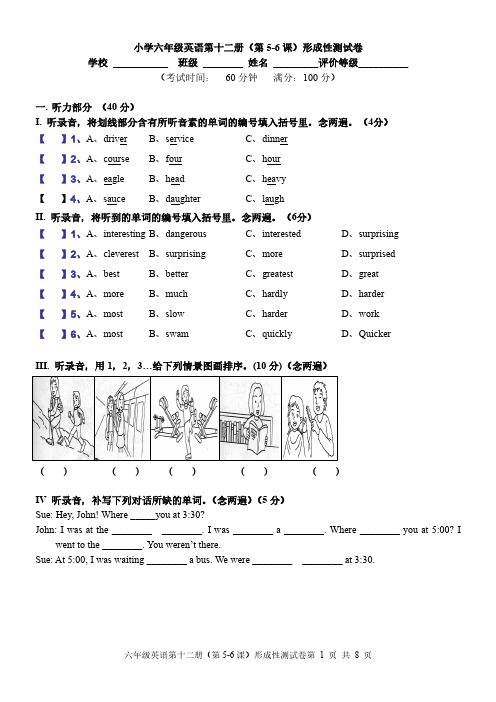
小学六年级英语第十二册(第5-6课)形成性测试卷学校___________ 班级________ 姓名_________评价等级__________(考试时间:60分钟满分:100分)一.听力部分(40分)I. 听录音,将划线部分含有所听音素的单词的编号填入括号里。
念两遍。
(4分)【】1、A、driver B、service C、dinner【】2、A、course B、four C、hour【】3、A、eagle B、head C、heavy【】4、A、sauce B、daughter C、laughII. 听录音,将听到的单词的编号填入括号里。
念两遍。
(6分)【】1、A、interesting B、dangerous C、interested D、surprising【】2、A、cleverest B、surprising C、more D、surprised【】3、A、best B、better C、greatest D、great【】4、A、more B、much C、hardly D、harder【】5、A、most B、slow C、harder D、work【】6、A、most B、swam C、quickly D、QuickerIII. 听录音,用1,2,3…给下列情景图画排序。
(10分)(念两遍)( ) ( ) ( ) ( ) ( )IV 听录音,补写下列对话所缺的单词。
(念两遍)(5分)Sue: Hey, John! Where _____you at 3:30?John: I was at the ________ ________. I was ________ a ________. Where ________ you at 5:00? I went to the ________. You weren’t there.Sue: At 5:00, I was waiting ________ a bus. We were ________ ________ at 3:30.VI.听短文录音,判断下面句子的正误,用T或F表示。
朗文环球英语教程5课后答案
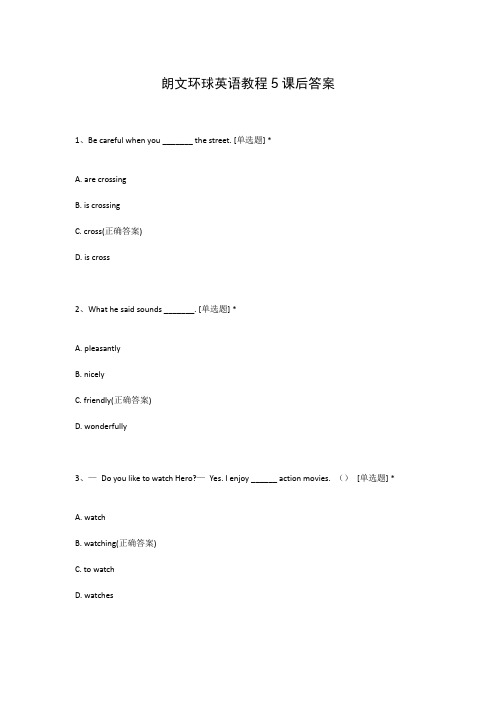
朗文环球英语教程5课后答案1、Be careful when you _______ the street. [单选题] *A. are crossingB. is crossingC. cross(正确答案)D. is cross2、What he said sounds _______. [单选题] *A. pleasantlyB. nicelyC. friendly(正确答案)D. wonderfully3、—Do you like to watch Hero?—Yes. I enjoy ______ action movies. ()[单选题] *A. watchB. watching(正确答案)C. to watchD. watches4、He was proud of what he had done. [单选题] *A. 对…感到自豪(正确答案)B. 对…感到满足C. 对…表示不满D. 对…表示后悔5、The commander said that two _____ would be sent to the Iraqi front line the next day. [单选题] *A. women's doctorB. women doctorsC. women's doctorsD. women doctor(正确答案)6、You can borrow my book, _____ you promise to give it back to me by the end of this month. [单选题] *A.even ifB. as long as(正确答案)C. in caseD. even though7、I_____you that I had made the right decision. [单选题] *A.ensuredB.insuredC.assured(正确答案)D.for sure8、They lost their way in the forest, and _____ made matters worse was night began to fall. [单选题] *A. thatB. itC. what(正确答案)D. which9、——Have you()your friend Bill recently? ———No, he doesnt often write to me. [单选题] *A. heard aboutB. heard ofC. heard from (正确答案)D. received from10、He doesn’t smoke and hates women _______. [单选题] *A. smokesB. smokeC. smokedD. smoking(正确答案)11、( ) The salesgirls in Xiushui Market have set a good example______us in learning English. [单选题] *A. to(正确答案)B. forC. withD. on12、The paper gives a detailed()of how to create human embryos (胚胎)by cloning. [单选题] *A. intentionB. description(正确答案)C. affectionD. effort13、There _______ some milk in the glass. [单选题] *A. is(正确答案)B. areC. haveD. has14、Jim will _______ New York at 12 o’clock. [单选题] *A. get onB. get outC. get offD. get to(正确答案)15、18.Monica wants to be a _______. She is good at sports and she loves teaching others. [单选题] *A.coach(正确答案)B.secretaryC.architectD.waiter16、______ my great joy, I met an old friend I haven' t seen for years ______ my way ______ town. [单选题] *A. To, in, forB. To, on, to(正确答案)C. With, in, toD. For, in, for17、The city is famous _______ its beautiful scenery. [单选题] *A. for(正确答案)B. ofC. asD. to18、_________ we don't stop climate change, many animals and plants in the world will be gone. [单选题] *A.AlthoughB.WhileC.If(正确答案)D.Until19、You should _______ your card. [单选题] *A. drawB. depositC. investD. insert(正确答案)20、Tom’s sister is a nurse. I met _______ in the street yesterday . [单选题] *A. sheB. hersC. himD. her(正确答案)21、While I _____ the morning paper, a headline caught my eye.. [单选题] *A. have readB. was reading(正确答案)C. had readD. am reading22、She _______ so much _______ her mother. [单选题] *A. looks; like(正确答案)B. looks; forC. looks; afterD. looks forwards; to23、88.Sorry. I don’t know the way? ? ? ? ? ?Dongfeng Cinema. [单选题] * A.byB.ofC.to(正确答案)D.for24、( )He gave us____ on how to keep fit. [单选题] *A. some advicesB. some advice(正确答案)C. an adviceD. a advice25、--Jenny, what’s your favorite _______?--I like potatoes best. [单选题] *A. fruitB. vegetable(正确答案)C. drinkD. meat26、?I am good at schoolwork. I often help my classmates _______ English. [单选题] *A. atB. toC. inD. with(正确答案)27、( ). The old man enjoys ______ stamps. And now he has1300 of them [单选题] *A. collectB. collectedC. collecting(正确答案)D. to collect28、The teachers don't make us wear a school uniform and we can wear _____ we like. [单选题] *A. anyB. thatC. asD. what(正确答案)29、He runs so fast that no one can _______ him. [单选题] *A. keep upB. keep awayC. keep up with(正确答案)D. keep on30、There is _______ meat in the fridge.Lets go and buy some. [单选题] *A. little(正确答案)B. a littleC. fewD. a few。
最新香港朗文5A 第五单元知识要点

Ch5背诵内容一、单词+音标1. special /'speʃl/ adj. 特殊的2. celebrate /'selɪbreɪt/ v.庆祝3. lantern /'læntən/ n. 灯笼;4. costume /'kɒstjuːm/n. 服装;戏装,剧装5. riddle /'rɪdl/ n.谜;谜语6. decorate /'dekəreɪt/ vt. 装饰;布置7. settler /'setlə/ n. 移居者;殖民者8. native /'neɪtɪv/ adj. 本国的;土著的9. harvest /'hɑːvɪst/ n. 收获;10. tourist /'tʊərɪst/ n. 旅行者,观光客11. splash /splæʃ/ vt. 溅,泼12. display /dɪˈspleɪ/ v. 陈列; 展出; 展示;13. warrior /ˈwɒrɪə/ n. (尤指旧时的) 武士,勇士14. banner /ˈbænə/ n. 横幅15. traditional /trə 'dɪʃnl / adj. 传统的16. festival / 'festɪvl / n. 节日;喜庆日;节期二、词组1. eat rice dumplings 吃粽子2. watch dragon boat races 看龙舟比赛3. get red packets 拿红包4. wear new clothes 穿新衣5. visit friends and relatives 拜访亲朋好友6. chat with each other 互相聊天7. guess (lantern) riddles 猜谜8. eat sweet dumplings 吃汤圆9. go hiking 去远足10. play with lanterns 玩灯笼11. eat moon cakes 吃月饼12. wear a costume/costumes 穿戏装13. eat a lot of sweets 吃很多糖14. give flowers to my mother 给妈妈花15. decorate the Christmas tree 装饰圣诞树16. send Christmas cards 寄圣诞贺卡17. give presents to my friends 给朋友礼物18. have a good harvest 有一个好收成19. the N ative A mericans 本土美国人;印第安人20. on the last Thursday of November 在11月的最后一个周四21. people from Europe 来自欧洲的人22. decide to hold a party 决定举办一个派对23. splash water on one another 向其他人泼水24. wash away bad luck 洗去厄运25. look forward to 期盼,盼望look forward to +n./doing26. display warrior dolls 展示武士娃娃27. put up 挂起;张贴28. cloth banners that look like fish 鲤鱼旗三、节日名称及时间1. Chinese New Year (the first day of the first month in Chinese lunar year / the firstday of the first lunar month)春节2. Dragon Boat Festival (the fifth day of the fifth lunar month)端午节3. Mid-Autumn Festival (the fifteenth day of the eighth lunar month)中秋节4. Double Ninth Festival (the ninth day of the ninth lunar month) 重阳节5. Lantern Festival (the fifteenth day of the first lunar month)元宵节6. Christmas (the twenty-fifth of December)圣诞节7. Halloween (the thirty-first of October)万圣节前夜8. Mother’s Day (the second Sunday of May )母亲节9. Thanksgiving (the last Thursday of November)感恩节10. the Water Festival (from 13th to 15th April = from the thirteenth to the fifteenth ofApril) 泼水节四、句子1. What do you do at (the) Dragon Boat Festivals? I eat rice dumplings.2. Which is your favorite festival? = Which festival do you like best?My favourite festival is (the) Lantern Festival. = I like (the) Lantern Festival best.3. Do you enjoy eating rice dumplings? Yes, I do. 你喜欢吃粽子吗?是的,我喜欢的。
朗文英语5a练习题
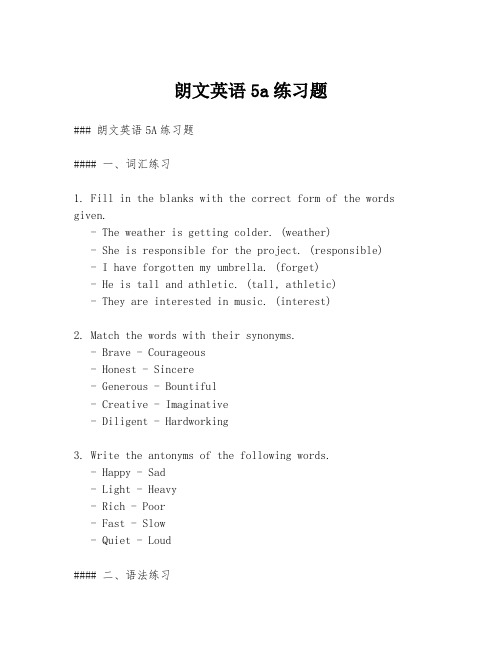
朗文英语5a练习题### 朗文英语5A练习题#### 一、词汇练习1. Fill in the blanks with the correct form of the words given.- The weather is getting colder. (weather)- She is responsible for the project. (responsible) - I have forgotten my umbrella. (forget)- He is tall and athletic. (tall, athletic)- They are interested in music. (interest)2. Match the words with their synonyms.- Brave - Courageous- Honest - Sincere- Generous - Bountiful- Creative - Imaginative- Diligent - Hardworking3. Write the antonyms of the following words.- Happy - Sad- Light - Heavy- Rich - Poor- Fast - Slow- Quiet - Loud#### 二、语法练习1. Choose the correct form of the verb to complete the sentence.- She has been studying English for three years. (study) - They were playing football when it started to rain. (play)- He has already finished his homework. (finish)- We are going to the cinema tonight. (go)2. Rewrite the sentences in the passive voice.- The teacher will give the students some advice. → The students will be given some advice by the teacher.- They are building a new bridge. → A new bridge is being built.- She has written a book. → A book has been written by her.3. Use the correct form of the modal verbs in the blanks.- You must complete the task before you leave. (must)- He could play the piano when he was five. (could)- They might go to the beach this weekend. (might)- She should have called before she came. (should)#### 三、阅读理解Read the following passage and answer the questions.Passage:In the heart of the city, there stands a beautiful park. The park is a popular spot for both locals and tourists. It is known for its lush green lawns and colorful flower beds.Every morning, people come to jog or do yoga. In the afternoon, families enjoy picnics under the shade of the old oak trees. The park also hosts various events throughout the year, including concerts and art exhibitions.Questions:1. Where is the park located?- The park is located in the heart of the city.2. What activities do people do in the park in the morning? - In the morning, people jog or do yoga in the park.3. What do families do in the park in the afternoon?- In the afternoon, families enjoy picnics under the shade of the old oak trees.4. What kind of events does the park host?- The park hosts various events such as concerts and art exhibitions.5. Who are the park's visitors?- The park's visitors include both locals and tourists.#### 四、写作练习Write a short paragraph about your favorite place to visit.My favorite place to visit is the local botanical garden.It's a tranquil haven amidst the bustling city. The garden boasts a wide variety of plants and flowers from all around the world. I love to wander along the winding paths, admiringthe vibrant colors and delicate fragrances. It's a perfect spot for relaxation and reflection, and I always leave feeling refreshed and inspired.Note: This exercise is designed to provide a comprehensive review of English language skills, including vocabulary, grammar, reading comprehension, and writing. It is suitable for learners at an intermediate level.。
朗文版小学英语5A各单元知识点汇总(新)

朗文版小学英语5A各单元知识点汇总(新)所谓的光辉岁月,并不是以后,闪耀的日子,而是无人问津时,你对梦想的偏执。
Unit 1 Changes at homeXXX baby喂养婴儿dress XXX给宝宝穿衣服take the baby for a walk带宝宝去散步have a baby生一个宝宝XXX XXX给宝宝读故事XXX XXX XXX教宝宝诗歌XXX XXX给宝宝洗澡share my toys with the baby同宝宝分享玩具I’m going to have a new brother or sister.我将要有一个弟弟或者妹妹了。
XXX is going to have a baby.我妈妈要生一个宝宝了。
I’m going to XXX XXX XXX.我打算要教宝宝诗歌。
I’m going to share my toys with the baby.我打算要同宝宝分享我的玩具。
XXX在XXX up醒过来XXX一些冲动听心的音讯What are you going to do to help your mother?你打算将来做什么来帮助你妈妈?Would you like to hold my baby?你想抱一下我的宝宝吗?I’m going to visit her every day.我打算每天都去看她。
I’m XXX.我打算去练照顾她。
XXX踮起你的脚尖。
get a new dog获得一只新狗go to the market with her同她一同去市场play with it同它一同玩XXX her Chinese教她汉语move home搬迁take it for a walk every day天天带它进来漫步go to a new school去一个新的黉舍live with XXX同爷爷一同糊口make some new XXX交一些新同伙drink XXX同他一同品茗have a new XXX有一个新的保母play XXX同他一同下棋I’m going to get a new dog.我将要获得一只新狗。
朗文英语5A复习资料提要

朗文英语5A复习资料提要朗文英语5A》复提要Chapter 1: Changes at HomePart A and BIn this chapter。
we learn about the changes that happen at home。
particularly when a new baby arrives。
Some of the vocabulary words and phrases we learn include "have a baby," "share my toys with the baby," "feed the baby," "read stories to the baby," "take photos of the baby," "have a bath," "teach the baby rhymes," "once upon a time," "take the baby for a walk," "bath the baby," and "dress the baby." We also learn about different XXX future XXX。
such as "I'm going to feed the baby," "She is going to bath the baby," "He is going to dress the baby," "They are going to take photos of the baby," and "We are going to take the baby for a walk."Part C and DIn these parts。
朗文少儿英语LEW5A Great Inventions

朗文少儿英语LEW5A Great Inventions IntroductionThe fifth unit of the LEW5A textbook focuses on great inventions. In this unit, students will learn about some of the most significant inventions in human history and how they have shaped our daily lives. This unit aims to enhance students’ English language skills while also promoting their curiosity and critical thinking abilities. By exploring the world of inventions, students will gain a deeper understanding of how human creativity and innovation have transformed the world we live in today.Lesson 1: The WheelOverviewThis lesson introduces students to one of the greatest inventions in human history - the wheel. Students will learn about the history of the wheel, its uses, and how it contributed to the development of transportation and machinery. Through various activities and discussions, students will also understand the importance of the wheel in their daily lives.Vocabulary•Invention•Wheel•Transportation•Machinery•Revolution•InnovationActivities1.Brainstorming & Discussion: Students willbrainstorm different uses of the wheel and discuss itsimpact on transportation and machinery.2.Vocabulary Task: Students will match thevocabulary words with their definitions.3.Reading Comprehension: Students will read ashort passage about the history of the wheel and answer comprehension questions.4.Role play: Students will participate in a role playactivity where they simulate different scenarios involving the use of wheels.Lesson 2: Printing PressOverviewIn this lesson, students will learn about the invention of the printing press and its impact on the spread of knowledge and information. They will explore the history of printing, from theearly methods used in ancient China to the revolutionary printing press invented by Johannes Gutenberg. Through interactive activities, students will appreciate the significance of the printing press in promoting literacy and revolutionizing communication.Vocabulary•Printing press•Knowledge•Information•Literacy•Communication•RevolutionizeActivities1.Group Discussion: Students will discuss theadvantages and disadvantages of the printing press inspreading knowledge and information.2.Vocabulary Exercise: Students will complete acrossword puzzle using the vocabulary words.3.Reading Task: Students will read a short passageabout the printing press and answer comprehensionquestions.4.Art Project: Students will create postersshowcasing the importance of literacy and the contribution of the printing press.Lesson 3: TelephoneOverviewIn this lesson, students will learn about the invention of the telephone and its impact on communication. They will delve into the history of telecommunications, from the early forms of long-distance communication to Alexander Graham Bell’s groundbreaking invention. Through activities and discussions, students will understand how the telephone revolutionized communication and made long-distance conversations possible.Vocabulary•Telephone•Communication•Telecommunications•Invention•ConversationActivities1.Research Task: Students will research the life andachievements of Alexander Graham Bell and present their findings to the class.2.Vocabulary Exercise: Students will completesentences using the vocabulary words.3.Listening Activity: Students will listen to arecorded conversation and answer comprehensionquestions.4.Role Play: Students will participate in a telephoneconversation role play, simulating a long-distance call.Lesson 4: InternetOverviewIn this lesson, students will learn about the invention of the internet and its impact on society. They will explore the history of the internet, the concept of the World Wide Web, and how it has transformed the way we communicate, access information, and interact with the world. Through various activities, studen ts will gain a deeper understanding of the internet’s significance in our daily lives.Vocabulary•Internet•World Wide Web•Society•Communication•InformationActivities1.Class Discussion: Students will discuss the pros andcons of internet usage in today’s so ciety.2.Vocabulary Task: Students will match thevocabulary words with their definitions.3.Reading Comprehension: Students will read anarticle about the history and impact of the internet andanswer comprehension questions.4.Creative Writing: Students will write a short essaydiscussing how the internet has influenced their livespositively or negatively.ConclusionThe LEW5A Great Inventions unit offers an exciting journey into the world of remarkable inventions. By studying these inventions and their significance, students will not only improve their English language skills but also develop critical thinking, research, and presentation abilities. This unit aims to inspire students to appreciate the power of human innovationand encourage them to explore their own inventiveness and creativity.。
朗文英语-5A-复习提要
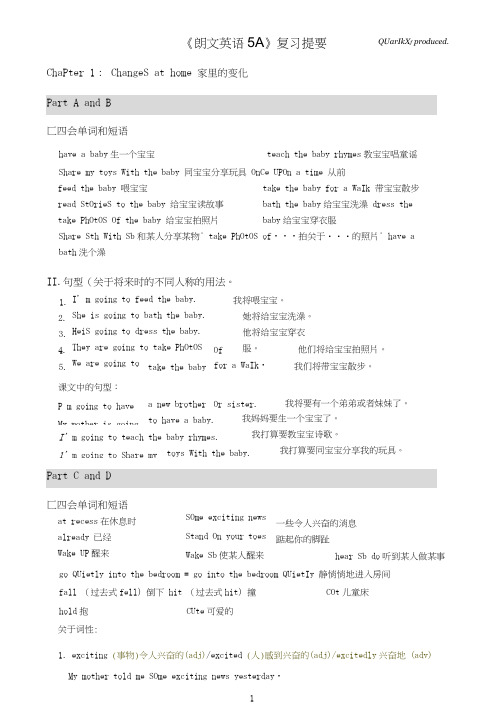
ChaPter 1: ChangeS at home 家里的变化匚四会单词和短语have a baby 生一个宝宝 teach the baby rhymes 教宝宝唱童谣Share my toys With the baby 同宝宝分享玩具 OnCe UPOn a time 从前feed the baby 喂宝宝read StOrieS to the baby 给宝宝读故事take PhOtOS Of the baby 给宝宝拍照片 take the baby for a WaIk 带宝宝散步 bath the baby 给宝宝洗澡 dress the baby 给宝宝穿衣服Share Sth With Sb 和某人分享某物° take PhOtOS of ・・・拍关于・・・的照片° have abath 洗个澡II.句型(关于将来时的不同人称的用法。
匚四会单词和短语at recess 在休息时already 已经Wake UP 醒来SOme exciting news Stand On your toes Wake Sb 使某人醒来 go QUietly into the bedroom = go into the bedroom QUietIy 静悄悄地进入房间fall (过去式fell )倒下 hit (过去式hit )撞COt 儿童床 hold 抱CUte 可爱的关于词性:1. exciting (事物)令人兴奋的(adj)/excited (人)感到兴奋的(adj)∕excitedly 兴奋地 (adv) My mother told me SOme exciting news yesterday ・《朗文英语5A 》复习提要QUarIkX f produced.1. 2. 3. 4. 5. I' m going to feed the baby.She is going to bath the baby. HeiS going to dress the baby.They are going to take PhOtOS We are going to take the baby Of我将喂宝宝。
- 1、下载文档前请自行甄别文档内容的完整性,平台不提供额外的编辑、内容补充、找答案等附加服务。
- 2、"仅部分预览"的文档,不可在线预览部分如存在完整性等问题,可反馈申请退款(可完整预览的文档不适用该条件!)。
- 3、如文档侵犯您的权益,请联系客服反馈,我们会尽快为您处理(人工客服工作时间:9:00-18:30)。
Unit 5 Learning DifferentlyTEACHER: Hello everyone. I think we can get started now. As we have studied in this class, there are many different ways of learning, and there are many different learning problems. Some people have problems with reading, or math, or with expressing their ideas in words. Some people have memory problems—for example, they have difficulty remembering what they hear or read. Other people have problems holding a pencil or pen so that they can write. As educators, these are challenges that we need to understand,because everyone deserves an education—and it's our job to promote learning. Today I'd like to talk about one common cause of learning problems—dyslexia. The term "dyslexia," that's D-Y-S-L-E-X-1-A, is from Greek. It means difficulty with words and language. In the first part of my talk, I'll briefly explain what dyslexia is and give you some general background about it. Then,in the second part, I will present one doctor's explanation of why people with dyslexia have learning difficulties. OK, what is dyslexia? Dyslexia means a difficulty with reading or writing. Before about 1970,researchers thought dyslexia was a visual problem. A problem seeing letters and words correctly. But this theory was never confirmed to be true. Researchers have now concluded that the main problem may be that dyslexics have trouble matching sounds with letters in words because their brains work differently from other people's. Let me explain that. Every word is made up of sounds, right? The sound units are called "phonemes.”Let's take the word "cat." Now, someone who is not dyslexic will read the word "cat" and be able to break it into the sounds, the phonemes Ca-A-Te. However, someone who has dyslexia has trouble breaking down the word into sounds, and as a result has trouble reading the word. There are other problems people with dyslexia may have, and not everyone who is dyslexic has the same problems. That's why there is no definition of dyslexia that is accepted by everyone. We do know, however, that a dyslexic person's brain works differently from other people's. Here are a few examples of students with dyslexia and their learning problems. Anna knows the answer to a question, but says the wrong words. Thomas studies hard for a spelling test. He can say how each word is spelled, but he cannot write the words correctly on the test. Kurt tries to pay attention in class, but he has trouble sitting still and listening. He can't concentrate, and his teachers think he doesn't care about school. Seiji has trouble with the order of things, such as the steps in a math problem, his history lessons, or even his own daily schedule. Susan has trouble following directions. She may confuse left and right….Yes, do you have a question? STUDENT 1: 1 don't understand about the boy who can't sit still. TEACHER: The boy who can’t concentrate in class? STUDENT 1: Yes. I mean how is that dyslexia? TEACHER: Well, typically, the child has trouble following spoken directions or understanding the steps in a lesson, and so he becomes very nervous or upset and can’t concentrate. OK?STUDENT 1:Oh, OK. So the dyslexia prevents him from concentrating? TEACHER: Right. These are some of the challenges for people with dyslexia. And as I said earlier, no two people have identical problems. Of course, there are other reasons why a student might not pay attention in class, or have trouble reading. However, these are problems someone with dyslexia may have because a dyslexic person’s brain worksdifferentlyfrom other people’s. Anothe r question, yes?STUDENT 2: How common is dyslexia?TEACHER: It's estimated that 10 percent of all school children are dyslexic. STUDENT 2: Wow, that's a lot. I heard that it only affects boys. That's not true, is it? TEACHER: No. Research has confirmed that both genders can have dyslexia. OK, so that gives you an idea of the problem,but what causes dyslexia? Researchers think that there may be a genetic basis for dyslexia, that the problem is inherited from the mother or the father. This is based on the fact that about 85 percent of children with dyslexia have either a mother or father who is dyslexic. What's interesting—as well as challenging for us educators—is that these kids generally score high on intelligence tests, but they usually can't read, write, or spell at the same level as their classmates. This can be a problem because other people, even their teachers, often don’t believe that the kids are very intelligent. In addition, dyslexics often feel like there's something wrong with them because they can't learn the same way other kids at school can. They often feel stressed and blame themselves, especially when other people say they are lazy and not trying. Many of them try very hard to learn, but Still have trouble. In this part of the lecture, I’1l present the work of Dr. Harold Levinson,a psychologist who has studied dyslexia for over twenty-five years. To help us understand dyslexia, he tells us to think of our brains as TV sets, and to think of the parts in our brains that receive information as computer chips. Every day, these chips, the parts in your brain, receive information, right? Now this information enters the brain as signals of what we see or hear or touch, and so on. Now, the job of these brain parts is to tune in the signals to different channels in our brain. Your brain receives the signals just as your TV set at home does, like it tunes in, say, Channel Five or Channel Six. Now, if these computer chips aren't working right, they can't receive the signals correctly. Nor can they tune in the correct channels. So the signals drift around and become unclear, and as the signals drift, this causes problems. For example, if a child's brain cannot receive the signals on a page as she reads, she has difficulty reading. If a child cannot tune in the signals he hears in class, he has difficulty understanding what the teacher tells him. If a signal drifts, this can also control energy levels, our ability to concentrate, our ability to distinguish what is important and unimportant. This is why some children have difficulty sitting still in class. The good news is that after many years of research, Dr. Levinson and others have concluded that the brain can learn to fix the drifting(固定漂流). Children who receive help often learn to deal with their individual problems, and do better in school. Naturally, it's best if the schools intervene(干预)and give help when the children are very young. It's also important that teachers,and you future teachers,be flexible about how you teach, and consider the different learning needs of students with dyslexia….In some special schools for dyslexic learners, the teachers read to the students. They don't require the students to read or write to learn. Teachers present lessons in a variety of ways. Students can take tests orally, rather than in writing. And reading and writing are taught as separate skills. This approach recognizes that these students are very capable of learning, but, need to be taught in a different way because they learn differently. This is a very positive step. So, today I've given you somegeneral ideas about what dyslexia is, and what educators are doing to help these students learn. OK, well,that'senough for today. We'll talk more about this in the next class.。
